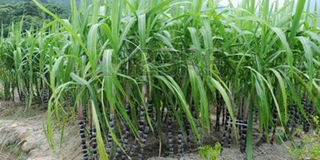Small-scale sugarcane growers trained on modern-day farming

What you need to know:
- This was said during a one-day symposium, which involved sugarcane stakeholders on modern farming, seedlings resistant to diseases, good methods of applying fertilisers and pests control.
Morogoro. The Kibaha Sugarcane Research Institute has advised small-scale sugarcane farmers to follow proper methods and refrain from setting their farms on fire in order to avoid losses.
This was said during a one-day symposium, which involved sugarcane stakeholders on modern farming, seedlings resistant to diseases, good methods of applying fertilisers and pests control.
The symposium was held in Morogoro Region recently.
Speaking during the symposium, the lead researcher from the Institute, Dr Hildelitha Msita said cases of destroyed sugarcane farms were largely happening during harvests because the farmers prefer quick ways of harvesting.
Due to various research findings by the institute over losses caused on farms destroyed by fires, she said they would now be focusing on training them on how to shun the business as usual faming.
According to her, they were planning to provide education to the farmers on modern agriculture so that they manage to harvest 90 to 120 tonnes of sugarcane per hectare.
The symposium attracted a number of participants including experts in sugarcane farming, farmers, leaders of the sugarcane growers association, members of the press, extension officers and radio programme producers from the ministry of Agriculture, Livestock and Fisheries.
“Small-scale sugarcane farmers have engaged in the business as usual cultivation that makes them obtain little harvests of 25 to 40 tonnes per hectare.
“Setting fire on their farms to make harvesting easy has cost a lot of them. Most of them have lost hope to continue with farming because of the losses they have been making for using improper methods,” said Dr Msita.
She advised that once sugarcanes are burned for the sake of harvesting, they should stay on the farms for 70 hours only otherwise they become useless.
Dr Msita suggested that a sugarcane farm could be protected by weeding out grass from all sides around the farm so that fire would not enter the farm.
Farmers will be educated on modern sugarcane cultivation and how to counter fire accidents through radio programmes after a panel of the crop stakeholders prepared a topic.




